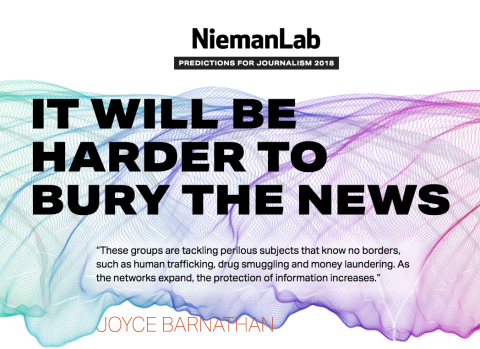
Regional investigative alliances are not only protecting journalists - they are protecting information, Barnathan writes.
This article first appeared Dec. 18 on Nieman Lab, as part of an annual feature asking thought leaders in journalism and digital media to share predictions for the coming year.
An investigative reporter from a city in central Mexico uncovered unsavory links between a notorious cartel member and the Mexican government. The piece was meticulously reported. The trouble was, the editor refused to publish it for fear of the consequences. But the story didn’t die there.
The journalist was part of the Connectas journalism network formed in 2013. Connectas links gumshoe reporters across the Americas, who collaborate on cross-border stories. Incensed by his boss’ refusal to touch the story, the reporter offered it to Mexican journalist Carmen Aristegui, who is not intimidated by the authorities. When the three-part series finally ran in Aristegui Noticias, it made headlines nationally and across the region.
In the coming year, it will be even harder to suppress the news thanks to regional investigative journalism alliances. These groups are tackling perilous subjects that know no borders, such as human trafficking, drug smuggling and money laundering. As the networks expand, the protection of information increases. And expanding they are in Latin America, the former Soviet bloc and Africa. Increasingly, U.S. news organizations are joining in, a trend that will intensify in 2018.
At first, these networks were formed to collaborate on transnational stories involving crime and corruption. They came into their own with the groundbreaking Panama Papers project. These regional groups were also designed to protect vulnerable journalists. How so? By publishing stories in multiple countries, the network would deflect attention from a single reporter or news organization. This really matters in countries where journalists can be attacked with impunity.
What these groups soon discovered was that they were not only protecting journalists, but also protecting information. If stories can be shared through the network, journalists can bypass major media owners who are cozy with the government or small newsrooms that are vulnerable to serious threats. This sharing of news circumvents self-censorship.
There is tremendous power in this growing network. As journalists join forces, they ensure their exposés will not be easily spiked. On top of that, an increasingly diverse group of funders sees the value in supporting these cross-border alliances.
Here’s to a year when journalists band together and counter suppression as never before.
The International Center for Journalists (ICFJ) helps journalists use best practices and new technologies to improve the quality of news media. ICFJ is committed to supporting Connectas and other investigative journalism networks around the world.